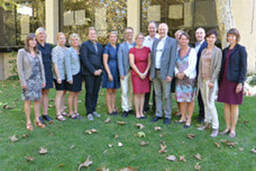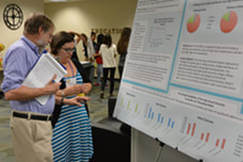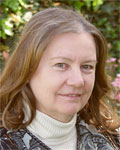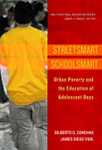Newsletter - Fall 2013

Distinguished Professor of Education Awarded 2013 Klaus J. Jacobs Research Prize
The Jacobs Foundation, a Zurich-based foundation that is active worldwide in promoting child and youth development, announced that economist Greg J. Duncan, UC Irvine Distinguished Professor of Education, is the recipient of the 2013 Klaus J. Jacobs Research Prize, which comes with an award of one million Swiss francs (US$ 1,000,000.00).
Professor Duncan has spent more than 30 years investigating the impact of poverty on children’s development. His research focuses primarily on issues of income distribution, poverty, and child well-being. Trained as an economist, he has always taken an interdisciplinary approach to exploring the complex dynamics of child and youth development, drawing on insights from the fields of economics, psychology, sociology, neuroscience and epidemiology.
For 25 years, Professor Duncan played a major role in the Panel Study of Income Dynamics (PSID), one of the world’s longest-running and most influential studies of human development. The study has been interviewing a representative sample of American families and their children since 1968, following children into the fourth decade of their lives. The study’s data have allowed Professor Duncan and his colleagues to find correlations between income in early life and life circumstances in adulthood: Children from poor families are less likely to finish school, and they work and earn less than their more fortunate peers. He also has shown that low family income has a stronger association with circumstances in adulthood when it occurs during the first five years of life than when it occurs later on.
UC Irvine News Feature Article
The Jacobs Foundation, a Zurich-based foundation that is active worldwide in promoting child and youth development, announced that economist Greg J. Duncan, UC Irvine Distinguished Professor of Education, is the recipient of the 2013 Klaus J. Jacobs Research Prize, which comes with an award of one million Swiss francs (US$ 1,000,000.00).
Professor Duncan has spent more than 30 years investigating the impact of poverty on children’s development. His research focuses primarily on issues of income distribution, poverty, and child well-being. Trained as an economist, he has always taken an interdisciplinary approach to exploring the complex dynamics of child and youth development, drawing on insights from the fields of economics, psychology, sociology, neuroscience and epidemiology.
For 25 years, Professor Duncan played a major role in the Panel Study of Income Dynamics (PSID), one of the world’s longest-running and most influential studies of human development. The study has been interviewing a representative sample of American families and their children since 1968, following children into the fourth decade of their lives. The study’s data have allowed Professor Duncan and his colleagues to find correlations between income in early life and life circumstances in adulthood: Children from poor families are less likely to finish school, and they work and earn less than their more fortunate peers. He also has shown that low family income has a stronger association with circumstances in adulthood when it occurs during the first five years of life than when it occurs later on.
- Receiving the Klaus J. Jacobs Research Prize is a great honor, and it comes at a perfect time. I am currently planning a new interdisciplinary study to be undertaken in collaboration with leading neuroscientists and developmental psychologists. The study will recruit a random sample of 1,000 young, low-income mothers of newborns. One group will receive a cash payment of $4,000 during each of the first three years of their children’s lives, while a control group will receive much smaller payments. We want to see whether we can find a direct link between poverty reduction and brain development in very young children. (Greg Duncan, Jacobs Foundation Press Release, 10/18/12)
UC Irvine News Feature Article

Jacquelynne Eccles Joins School of Education as Distinguished Professor
Jacquelynne Eccles, formerly McKeachie-Pintrich Distinguished University Professor of Pyschology and Education at the University of Michigan, has joined the UC Irvine School of Education as Distinguished Professor of Education. Professor Eccles is the second Distinguished Professor of Education in the School, along with Greg Duncan, and is the third School of Education member of the National Academy of Education, along with Professor Duncan and Professor Rubén Rumbaut.
Professor Eccles's research interests include family and school influences on development; development in high risk settings; development of self-esteem, activity preferences, and task choice; adolescent development; identity formation; transition into adulthood; biosocial influences and development; gender role development; and role of ethnicity in development and socialization. Her recent work includes investigations of (a) declines in adolescents' motivation, self-concept, and mental health associated with the junior and senior high school transitions; (b) development of self-schema and motivational beliefs during middle childhood years in the context of family and school environments; and (c) impact of family, social class, school, neighborhood, and ethnicity on the development of motivation, self-schemas, mental health, and engagement in both positive and risky activities among a large sample of Black and white adolescents.
Most recently Professor Eccles has been awarded the American Psychological Foundation 2013 Gold Medal for Life Achievement.
Jacquelynne Eccles, formerly McKeachie-Pintrich Distinguished University Professor of Pyschology and Education at the University of Michigan, has joined the UC Irvine School of Education as Distinguished Professor of Education. Professor Eccles is the second Distinguished Professor of Education in the School, along with Greg Duncan, and is the third School of Education member of the National Academy of Education, along with Professor Duncan and Professor Rubén Rumbaut.
Professor Eccles's research interests include family and school influences on development; development in high risk settings; development of self-esteem, activity preferences, and task choice; adolescent development; identity formation; transition into adulthood; biosocial influences and development; gender role development; and role of ethnicity in development and socialization. Her recent work includes investigations of (a) declines in adolescents' motivation, self-concept, and mental health associated with the junior and senior high school transitions; (b) development of self-schema and motivational beliefs during middle childhood years in the context of family and school environments; and (c) impact of family, social class, school, neighborhood, and ethnicity on the development of motivation, self-schemas, mental health, and engagement in both positive and risky activities among a large sample of Black and white adolescents.
Most recently Professor Eccles has been awarded the American Psychological Foundation 2013 Gold Medal for Life Achievement.
Researchers Awarded $6.4 Million NSF Math Science Partnership Grant: "Equitable Science Curriculum for Integrating Arts in Public Education (ESCAPE)"
|
Associate Professor School of Education affiliated faculty member Brad Hughes and Associate Professor Liane Brouillette have been awarded a $6,400,000, five-year National Science Foundation (NSF) Grant to use innovative arts-based strategies to help English Language Learners in grades 3-5 develop the academic language to understand scientific concepts. Titled "Equitable Science Curriculum for Integrating Arts in Public Education (ESCAPE)," the grant will engage University of California STEM faculty (with support from UC Irvine's Cal Teach Math and Science preservice teacher development program); teachers and administrators from the Orange County Department of Education (OCDE) and six high-need Southern California school districts; WestEd educational consultants, and the Segerstrom Center for the Arts. Serving as Co-Principal Investigators will be Philip Collins (Associate Professor of Physics and Astronomy), Michelle Rodriguez (Chief Academic Officer, Educational Services), and Christine Olmstead (OCDE).
Over four years, each of 150 teachers will receive 220 hours of team-based professional development in using science kits and illustrating science concepts through the arts. Over the project's five years, the 150 teachers will teach ~21,000 students, and ~180 Cal Teach preservice teachers will be trained. Project goals are to increase (a) teacher content and pedagogical knowledge in Earth, Physical, and Life Science; (b) integration of arts to boost ELL learning; and (c) student achievement on science and language development tests. Planned for national distribution at the end of the project are an ELL-accessible curriculum for Earth, Physical, and Life Science in grades 3-5; a video-based online system for training teachers (providing a university Certificate in Teaching Science through the Arts); and a research-tested model for improving teacher and student achievement. |
|
Author Donates Royalties from Streetsmart Schoolsmart to American Sociological Association's Minority Fellowship Program
Associate Professor and author Gilberto Q. Conchas is donating the royalties from his co-authored publication Streetsmart Schoolsmart: Urban Poverty and the Education of Adolescent Boys to the American Sociological Association's (ASA) Minority Fellowship Program (MFP). Dr. Conchas researches diversity and equity, race and urban education, school reform, and immigration. He serves as the School of Education faculty representative for DECADE (Diverse Educational Community and Doctoral Experience). In explaining his decision, Dr. Conchas credits the support he received as an undergraduate at University of California, Berkeley from the ASA's then-active Minority Opportunity Summer Training (MOST) program.
|

Assistant Professor Jaeggi Co-publishes Lead Article in new Journal of Intelligence: "Challenges for Research on Intelligence"
Assistant Professor of Education Susanne Jaeggi's article "Challenges for Research on Intelligence," co-authored with Earl B. Hunt (University of Washington Department of Psychology) was selected as the lead article for the new Journal of Intelligence. Dr. Jaeggi, who joined the School of Education this year from the University of Maryland Department of Psychology and Program in Neuroscience and Cognitive Science, researches working memory, executive control, plasticity, training, and transfer.
Abstract: After 100 years of research, the definition of the field is still inadequate. The biggest challenge we see is moving away from a de-facto definition of intelligence in terms of test scores, but at the same time making clear what the boundaries of the field are. We then present four challenges for the field, two within a biological and two within a social context. These revolve around the issues of the malleability of intelligence and its display in everyday life, outside of a formal testing context. We conclude that developments in cognitive neuroscience and increases in the feasibility of monitoring behavior outside of the context of a testing session offer considerable hope for expansion of our both the biological and social aspects of individual differences in cognition.
Full Article
Assistant Professor of Education Susanne Jaeggi's article "Challenges for Research on Intelligence," co-authored with Earl B. Hunt (University of Washington Department of Psychology) was selected as the lead article for the new Journal of Intelligence. Dr. Jaeggi, who joined the School of Education this year from the University of Maryland Department of Psychology and Program in Neuroscience and Cognitive Science, researches working memory, executive control, plasticity, training, and transfer.
Abstract: After 100 years of research, the definition of the field is still inadequate. The biggest challenge we see is moving away from a de-facto definition of intelligence in terms of test scores, but at the same time making clear what the boundaries of the field are. We then present four challenges for the field, two within a biological and two within a social context. These revolve around the issues of the malleability of intelligence and its display in everyday life, outside of a formal testing context. We conclude that developments in cognitive neuroscience and increases in the feasibility of monitoring behavior outside of the context of a testing session offer considerable hope for expansion of our both the biological and social aspects of individual differences in cognition.
Full Article

Afterschool Outcome Measures Online Toolbox Assesses 21st Century Skills
Developed at the University of California, Irvine School of Education, the Afterschool Outcome Measures Online Toolbox is being used by more than 1,500 programs across the United States to measure the quality of youth experiences and guide quality improvement efforts.
The Toolbox is an online data system that allows programs to collect student outcome measures in the areas of skill development and positive behavior. Surveys are collected at two points (Time 1: Fall/Winter and Time 2: Spring) so that changes in student behavior across the program year can be measured.
Extensive field tests, involving thousands of California students in grades 3 to 12, have determined that the Online Toolbox can be used easily and reliably. Three types of surveys are available: student self-reports, program staff reports, and classroom teacher reports of student outcomes. Participating programs can choose which types of reports they are interested in receiving.
Student self-reports include scales of skill development (Work Habits, English, Math and Science Efficacy) and positive behavior (Social Competencies, Reductions in Misconduct). Staff and teacher reports assess student outcomes in skill development (Work Habits, Task Persistence) and positive behavior (Prosocial Behavior with Peers, Social Skills, Reductions in Aggressive Behavior). The teacher report includes a Mock Report Card that measures student academic performance in the classroom.
Students also report the quality of their program experiences in three areas: positive relationships with program staff, interest in program activities, and positive relationships with peers at the program.
Developed at the University of California, Irvine School of Education, the Afterschool Outcome Measures Online Toolbox is being used by more than 1,500 programs across the United States to measure the quality of youth experiences and guide quality improvement efforts.
The Toolbox is an online data system that allows programs to collect student outcome measures in the areas of skill development and positive behavior. Surveys are collected at two points (Time 1: Fall/Winter and Time 2: Spring) so that changes in student behavior across the program year can be measured.
Extensive field tests, involving thousands of California students in grades 3 to 12, have determined that the Online Toolbox can be used easily and reliably. Three types of surveys are available: student self-reports, program staff reports, and classroom teacher reports of student outcomes. Participating programs can choose which types of reports they are interested in receiving.
Student self-reports include scales of skill development (Work Habits, English, Math and Science Efficacy) and positive behavior (Social Competencies, Reductions in Misconduct). Staff and teacher reports assess student outcomes in skill development (Work Habits, Task Persistence) and positive behavior (Prosocial Behavior with Peers, Social Skills, Reductions in Aggressive Behavior). The teacher report includes a Mock Report Card that measures student academic performance in the classroom.
Students also report the quality of their program experiences in three areas: positive relationships with program staff, interest in program activities, and positive relationships with peers at the program.
 2013 Education Delegation from Nacka, Sweden
2013 Education Delegation from Nacka, Sweden
Education Delegation from Nacka, Sweden Visits School of Education for Fifth Educational Technology Symposium
On October 15, 14 educators from Nacka Municipality, Sweden, returned to the School of Education for the fifth year to continue sharing experiences and exchange information about the integration of technology in educational settings.
During their time in Orange County, the educators visited K-12 school sites before coming to UC Irvine. In the morning session at the School of Education, Michael Morrison, Chief Technology Officer, and Christopher Bell, Instructional Technology Coordinator, discussed technology innovations in the Saddelback Unified School District. Reviewing technology usage in the Tustin Unified School District were Crystal Turner, Assistant Superintendent of Administrative Services; Robert Craven, Senior Director of Information Technology; and Garrett Kerr, Coordinator of Educational Technology. K-12 technology topics included needs of the 21st century learner and the 21st century classroom; technology integration into project-based learning; technology and the Common Core; project management tools; advantages, limitations, and future trends of the BYOD (Bring Your Own Device); selection options for one-to-one usage, importance of teacher support; and tools for developing presentation skills. Professor Mark Warschauer followed the district presentations with a discussion of research findings from his studies of cloud-based learning in K-12 schools and of Live Ink.
The morning closed with presentations by Swedish visitors Lars Ekelöw, IT Strategist, and Helena Ekewall, Manager of Education Administration, who discussed research findings from their technology program, and Principal Åsa Portelius of the Sikla School, who reviewed the integration of technology into programs for students with special needs.
On October 15, 14 educators from Nacka Municipality, Sweden, returned to the School of Education for the fifth year to continue sharing experiences and exchange information about the integration of technology in educational settings.
During their time in Orange County, the educators visited K-12 school sites before coming to UC Irvine. In the morning session at the School of Education, Michael Morrison, Chief Technology Officer, and Christopher Bell, Instructional Technology Coordinator, discussed technology innovations in the Saddelback Unified School District. Reviewing technology usage in the Tustin Unified School District were Crystal Turner, Assistant Superintendent of Administrative Services; Robert Craven, Senior Director of Information Technology; and Garrett Kerr, Coordinator of Educational Technology. K-12 technology topics included needs of the 21st century learner and the 21st century classroom; technology integration into project-based learning; technology and the Common Core; project management tools; advantages, limitations, and future trends of the BYOD (Bring Your Own Device); selection options for one-to-one usage, importance of teacher support; and tools for developing presentation skills. Professor Mark Warschauer followed the district presentations with a discussion of research findings from his studies of cloud-based learning in K-12 schools and of Live Ink.
The morning closed with presentations by Swedish visitors Lars Ekelöw, IT Strategist, and Helena Ekewall, Manager of Education Administration, who discussed research findings from their technology program, and Principal Åsa Portelius of the Sikla School, who reviewed the integration of technology into programs for students with special needs.
 George Farkas Advising Brandy Jenner
George Farkas Advising Brandy Jenner
Ph.D. Students Showcase First Year Research During 2013 Poster Presentations
Ph.D. students entering their second year of doctoral study exhibited findings from their first year research at the School of Education's 2013 Poster Presentation Session on September 27th.
During their initial year of study, students had worked closely with advisors to analyze research in their field of specialization. After posters had been judged worthy of printing by the student's advisor, the posters then were judged during the Friday session by the Director of the Ph.D. Steering Committee, Professor George Farkas.
The School of Education's annual poster session models presentation at national level conferences and is intended to prepare the students to present their poster at conferences during their second year.
Passing the poster requirement is the first benchmark for the Ph.D. in Education students. The second benchmark requires writing a research paper of publishable quality. During their third year, before defending their dissertation proposal, students must complete a theme paper that may be a literature review, a policy paper, or a course outline.
Poster Titles and Abstracts
Ph.D. students entering their second year of doctoral study exhibited findings from their first year research at the School of Education's 2013 Poster Presentation Session on September 27th.
During their initial year of study, students had worked closely with advisors to analyze research in their field of specialization. After posters had been judged worthy of printing by the student's advisor, the posters then were judged during the Friday session by the Director of the Ph.D. Steering Committee, Professor George Farkas.
The School of Education's annual poster session models presentation at national level conferences and is intended to prepare the students to present their poster at conferences during their second year.
Passing the poster requirement is the first benchmark for the Ph.D. in Education students. The second benchmark requires writing a research paper of publishable quality. During their third year, before defending their dissertation proposal, students must complete a theme paper that may be a literature review, a policy paper, or a course outline.
Poster Titles and Abstracts





